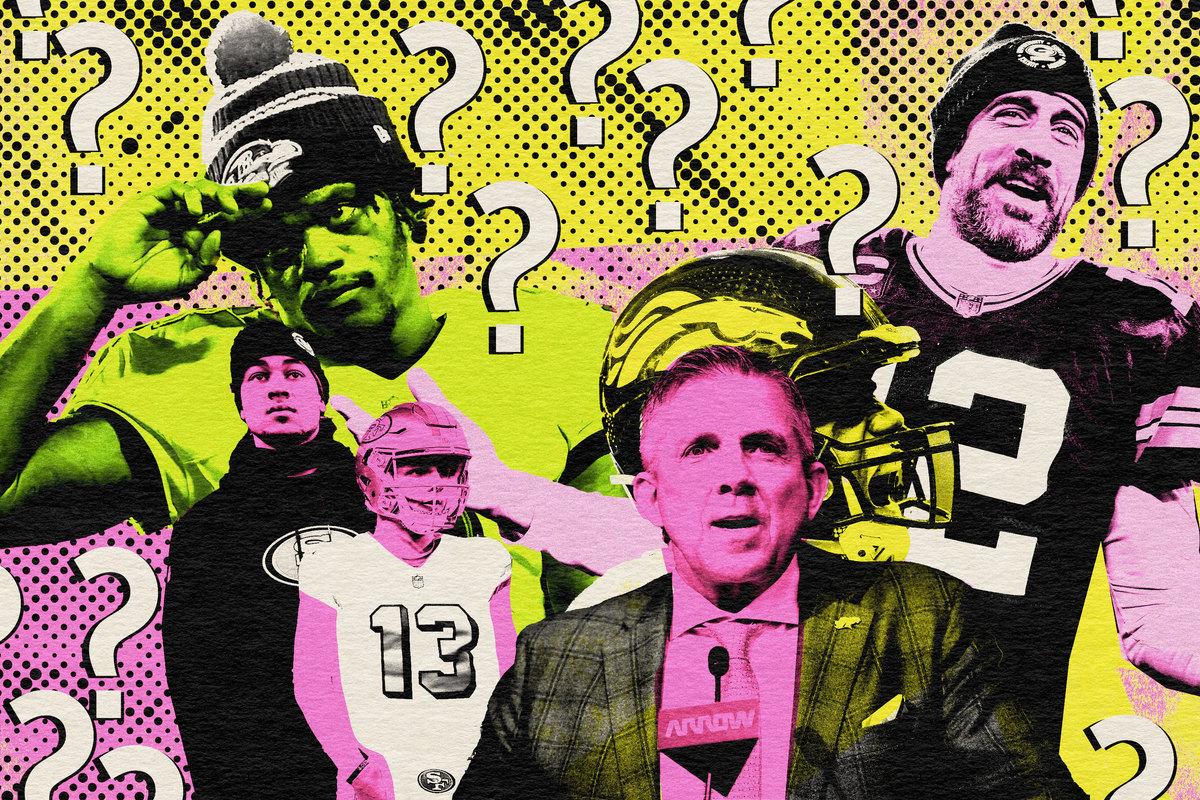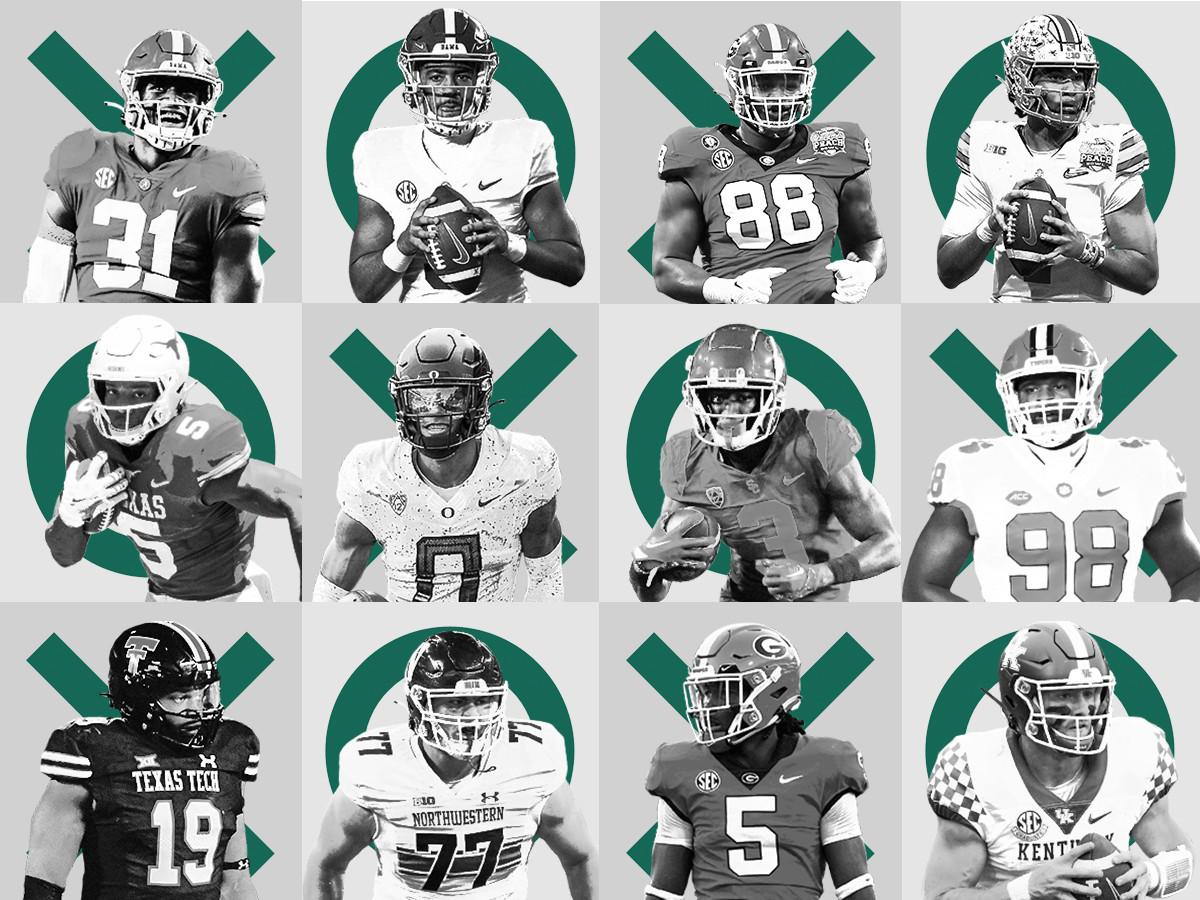
The 2022 NFL season is finally history, and now we turn our attention to the 2023 offseason, which should be full of quarterback movement (the carousel began spinning Tuesday when the Raiders released Derek Carr), contract drama, and some true intrigue at the top of the NFL draft. The Ringer’s NFL writers picked the most interesting story lines of the offseason, and no surprise here, nearly all of them involve quarterbacks.
Which Teams Will Land Which Veteran QBs?
If your team is in need of a mediocre bridge quarterback, you have come to the right offseason. Tampa Bay, Washington, Carolina, New Orleans, and perhaps Arizona—if Kyler Murray’s rehab from his January 3 knee surgery keeps him out for much or all of next season—could be in the veteran quarterback market. (The Texans, Colts, and Jets each also need a QB, but the first two are most likely to draft one, and for now we’ll keep the Jets atop the list of teams that could be looking to trade for Aaron Rodgers. More on all of those scenarios in a bit.)
Those first four teams will likely be heavily invested in the Derek Carr bidding war—man, that’s a sad collection of words—and the ones that miss out will have to fight over Jimmy Garoppolo. From there, the consolation prize is Andy Dalton, who’s coming off a decent year with the Saints, or maybe it’s Baker Mayfield or Jacoby Brissett, depending on your taste in quarterbacks. But good luck talking your fan base into any of those options. A couple of teams may have to.
The takeaway here is that in this quarterback market, patience will not be a virtue. If any of the teams listed above have playoff aspirations, they’ll need to get their work done quickly. They shouldn’t wait around and let somebody fall to them. That’s how you end up posting a “QB1” tweet that gets ratioed to hell. —Steven Ruiz
Will Aaron Rodgers Emerge From the Darkness and Choose the Jets?
Sometime soon, Rodgers will embark on a four-day darkness retreat to decide whether he wants to return to the NFL. (NFL Media’s Ian Rapoport reported Sunday that the darkness retreat had already begun, but Rodgers appeared on The Pat McAfee Show on Tuesday, so unless this retreat includes media breaks, it hasn’t started yet.) If Rodgers chooses to continue playing football, he might end up on the New York Jets, who have been on a half-century darkness retreat. Rodgers merely adapted to the dark. Jets fans didn’t see the light until they were, uh—actually, it’s not clear whether any Jets fans under 60 have ever seen the light.
Let’s rewind here. Rodgers and the Packers structured the massive three-year, $150 million extension he signed last year so that Rodgers could find a new team this offseason—or at least do so in a way that would allow the Packers to choose between keeping him or 2020 first-round pick Jordan Love. It seems likely that Green Bay will choose Love and send Rodgers into exile (or New Jersey).
But Rodgers is getting paid so much—his combined cap hit for the next two years is $72.3 million, according to Over the Cap—that no team will trade for him unless he wants to go there, so he essentially has a no-trade clause. And, as I laid out last month, since the Packers don’t want to send Rodgers to another NFC team and potentially face him in the playoffs, that leaves as possible trade destinations AFC squads that need a QB but also have a roster good enough to woo Rodgers out of the darkness. And that really leaves three teams: the Jets, the Raiders, and the Titans. Vegas is closer to Rodgers’s heart (with Davante Adams) and home (in California). The Titans have the best vibes and the easiest division to win in football. The Jets have the best roster but are the Jets. Decisions, decisions. Whoever wants to part with, let’s say, a Day 2 pick in 2023 and a conditional first in 2024 could bring Rodgers in—as long as he makes it out of that weird Dark Knight Rises Batman cave. —Danny Heifetz
What’s Up With Lamar Jackson and the Ravens?
We know that Lamar Jackson won’t hit free agency, but we also can’t be 100 percent certain that he’s the Ravens’ starting quarterback in Week 1 of next season. The two sides have talked contract for a while now and still haven’t found a compromise. How will this play out? There are four scenarios:
1. The two sides finally agree on a long-term contract. This would be the cleanest outcome. Jackson would remain the face of the franchise for years to come, and everybody would be happy. But given that it hasn’t happened yet, it’s fair to wonder whether they’ll ever get there.
2. The Ravens use the exclusive franchise tag on Jackson, he signs it, and he plays on a one-year deal. This would mean a one-year, $45.2 million contract for Jackson. His contract situation would remain a talking point next season, and all that money would count against the Ravens’ 2023 cap, making it more challenging to address other aspects of the roster. Not ideal. (The Ravens could also place the non-exclusive tag on Jackson, which carries a salary of about $32 million for 2023, but it seems unlikely Baltimore would risk letting him negotiate with another team and then having to match a salary offer.)
3. The Ravens use the franchise tag on Jackson, but he refuses to sign it. This would be the most disastrous outcome. Jackson wouldn’t play and would give up a lot of money. But given what we’ve seen so far, we can’t rule this option out.
4. The Ravens use the franchise tag on Jackson and then trade him. This seems unlikely, given that the Ravens have built their team around Jackson, and he’s only 26 years old. But if the two sides can’t agree on a long-term extension, and another team is willing to pay Jackson what he thinks he’s worth, a trade isn’t out of the question. The Ravens would undoubtedly take a step back, but given how desperate teams are for young quarterbacks, they’d likely receive a haul for Jackson the likes of which we’ve never seen.
Stay tuned. This is probably the most unpredictable story in the NFL right now. —Sheil Kapadia
Who Will Be the 49ers’ QB1: Trey Lance or Brock Purdy?
In September, Trey Lance figured to be the 49ers’ quarterback of the future. In October, it seemed like that honor belonged to Jimmy Garoppolo. In December and January, it was Brock Purdy. Now it’s February, and San Francisco is back where it usually is this time of year: stuck figuring out who’s going to play quarterback next season. Despite making big trades for Garoppolo (in 2017) and to move up to get Lance in the 2021 draft, the 49ers have had six quarterbacks—that’s Garoppolo, Nick Mullens, C.J. Beathard, Brian Hoyer, Purdy, and Lance—start at least four games apiece since 2017 and still can’t get off the spin cycle at the position.
What that looks like this offseason is this: Garoppolo is headed for free agency and coach Kyle Shanahan said earlier this month that “I don’t see any scenario” in which he’d return in 2023. Purdy and Lance are under contract, but Purdy is set to have his torn ulnar collateral ligament in his right elbow surgically repaired on February 22, after which he will face what Shanahan said will be a roughly six-month recovery period. That would get him back to practice in late August, give or take. In the meantime, San Francisco could take another look at Lance, who currently has fewer passing attempts in his entire high school, college, and NFL career (798) than Tom Brady took this season at 45 years old (799). As much as it has been Shanahan and general manager John Lynch’s tendency to get crazy at the QB position, the 49ers are middle of the pack (16th) in salary cap room and don’t have a draft pick until the third round this year, so their resources to go big once more are limited. I still find it hard to believe they wouldn’t sniff around a trade for Aaron Rodgers, but I also don’t know what they could offer to make it work, and Shanahan has said he’s comfortable sticking with Lance and Purdy. “I know we have two starters on our team right now that I believe we can win with,” he said earlier this month. “When you have that situation, you’re not that eager to go looking around.” Obviously this will all end in Garoppolo somehow making his way back to San Francisco, as is tradition. —Nora Princiotti
Who Wants Will Levis?
It is once again time for NFL teams to clamor over the right to risk their football future on a player who does not seem particularly good at football. This time it’s Kentucky’s Will Levis, leader of college football’s 112th-ranked scoring offense in 2022—and the potential top pick in the draft. (The Ringer’s 2023 NFL Draft Guide ranks him as the 14th best prospect in the draft, but projects him as the no. 4 pick.) Levis threw 43 touchdowns in two seasons at Kentucky, while his two competitors to be the first QB off the board, Alabama’s Bryce Young and Ohio State’s C.J. Stroud, each threw at least 44 touchdowns in the 2021 season alone. I’ll remember Levis for going 11-for-23 with no TDs and an interception in a loss last season to Vanderbilt, which had lost 26 consecutive SEC games before beating Kentucky 24-21.
NFL teams might not see many touchdowns on his highlight tape, but they look at him and see Josh Allen. Allen’s Wyoming teams also barely scored, but he’s gone on to prove pre-draft haters (like me!) wrong by combining his size and strength with improved passing accuracy to become one of the NFL’s most dangerous weapons. That said, Allen is larger than Levis—6-foot-5 vs. 6-foot-3—and to my eye, has the stronger arm. And it’s still debatable whether Allen’s road to superstardom is repeatable or whether other teams would be chasing ghosts by trying to find the next Allen. Who’s willing to use a top-five pick on the guy who lost to Vandy to find out? —Rodger Sherman
Will the Sean Payton–Russell Wilson Marriage Work?
I’ve listened to a lot of Sean Payton interviews recently (including Payton’s hit on Slow News Day with The Ringer’s Kevin Clark) and the new Broncos head coach isn’t bringing up his new quarterback as a reason he wanted the job in Denver. He mentions ownership and general manager George Paton and the Colorado fan base, but not Wilson. That’s telling me that Payton understands just what a challenge he has ahead of him to craft an offense that works for an aging, expensive star quarterback who is coming off the worst year of his career. But surely Payton knows that his relationship with Wilson and what they are able to accomplish together matters more than glad-handing with his new bosses or pandering to a desperate fan base.
Payton arrives in Denver with a rock-solid offensive coaching résumé and the authority to tell Wilson what he needs to do as a player on the field and as a leader in the locker room—or, perhaps more importantly, what he shouldn’t do. Payton can speak to the experience of having coached Drew Brees in the latter stages of his career when his physical skills had declined. There will be no question now of who is in charge and who is running the offense—it’s Payton, and Wilson should have no choice but to listen. What will that offense look like, and will it work? That’s what I can’t wait to find out. —Lindsay Jones
What Will the Chicago Bears Do at No. 1?
With about $95 million and change in cap space and the first pick at their disposal, the world is the Bears’ oyster this offseason. I’m particularly excited to see what they do with the pick, and basically everything should be on the table for a team with needs across the board: They could take a big-impact defender there in Georgia defensive tackle Jalen Carter or Alabama edge rusher Will Anderson Jr., or they could trade back out of that spot and pick up a king’s ransom of picks. And while early indications are that they’re planning to keep Justin Fields and build around the third-year quarterback, it’s not out of the question that they could trade Fields and select their favorite quarterback in this draft at that spot, too. Whether Chicago sticks and picks or trades back to a QB-needy team, its decision will create a ripple effect throughout the rest of the draft. —Danny Kelly
Do AFC Contenders Have a Counterpunch to Match Kansas City?
The Chiefs just won the Super Bowl with a borderline superhuman version of Patrick Mahomes, running an offense that somehow got better in 2022 after losing Tyreek Hill. The Chiefs’ win was impressive in many ways, not just schematically. Mahomes is now the first quarterback ever to win a Super Bowl while accounting for more than 12.5 percent of his team’s payroll, according to SumerSports’ Tej Seth, and Mahomes did so with his 2022 cap hit at a whopping 17.2 percent.
How in the hell is the rest of the AFC supposed to keep up when the Chiefs can win like that? That’s the big question top contenders like the Bills and Bengals will spend this offseason figuring out. Josh Allen’s cap hit will jump from 7.9 percent of the Bills’ payroll in 2022 to 17.6 percent in 2023. Lamar Jackson should clear the $45 million per year mark with the Ravens (or another team, as Sheil discussed above) in the next few months. Joe Burrow could sign a record-setting contract extension as soon as this offseason, and the Chargers’ Justin Herbert will join the club shortly after. The Chiefs’ biggest contenders all have to improve their rosters while paying significantly more money to quarterbacks that aren’t even in the same tier as Mahomes. —Austin Gayle


